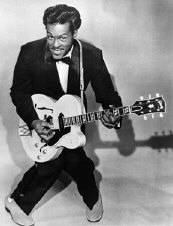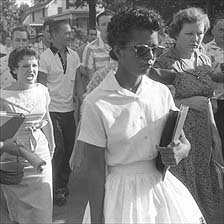
I'll admit, I danced and sang along to Chuck Berry records in the 1950's. If asked at that time, we would have said he was "cool." This AM I heard one of his hits, "Sweet Little Sixteen." Here are some of the lyrics:
Sweet Little SixteenThis sounds rather idyllic, doesn't it? I doubt seriously if Chuck Berry was singing to a Black audience. They had more serious things on their mind:
She's got the grown up blues
Tight dress and lipstick
She's sportin' high heal shoes
Oh, but tomorrow morning
She'll have to change her trend
And be sweet sixteen
And back in class again

What I am trying to say here is that History can frequently be distorted. The reality is that black children in the 1950's were probably not living the life depicted by Chuck Berry. (Just as Baghdad is not the place that George Bush thinks it is.) We projected our white faces onto the persona of those people in Berry's songs. For instance, Johnny B. Good was almost certainly a Black, Johnnie Johnson, Berry's piano player:
On earlier unreleased takes Chuck sang 'colored boy' for 'country boy', but the Chess-brothers decided that that would not sell.Finally, from here:
Not all racial segregation laws have been repealed in the United States, although Supreme Court rulings have rendered them unenforceable. For instance, the Alabama Constitution still mandates that Separate schools shall be provided for white and colored children, and no child of either race shall be permitted to attend a school of the other race. [7] A proposal to repeal this provision was narrowly defeated in 2004.
No comments:
Post a Comment